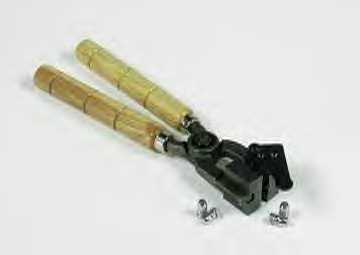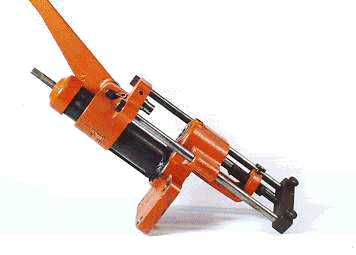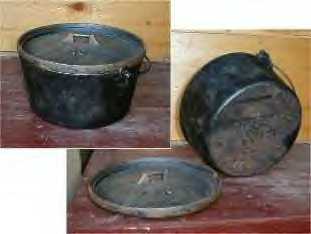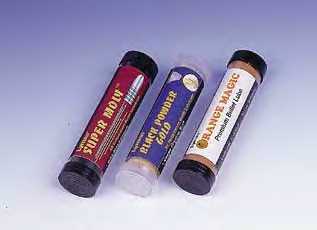|
MENU
CLICK HERE
TO VISIT THE CAST BOOLITS FORUM
|
|
|
|
| Molds... |
 I use alot of Lee equipment. As a matter of fact, I probably have more Lee reloading equipment than any other brand. That being said, I must also say that I no longer use Lee bullet molds. I started using Lee molds and they did very well for awhile. However, they are no longer cost effective for me.
For the person that casts 400 to 1000 bullets a year the Lee molds are great. They certainly did well for me at that point. However, I now cast 400 to 1000 bullets a month, usually more and that is when the Lee molds started to go south on me. They just didn't seem to hold up to that kind of volume. I wore them out in short order. Lee molds are made from aluminum and they tend to show wear and tear much quicker than steel molds. There are other manufactures of aluminum molds out there, but I haven't used any of these, so I cannot address those directly. It's simply my opinion that aluminum is not suited for heavy use.
Lyman/Ideal molds are my favorite. All steel, well made and enough bullet designs to satisfy even the most demanding caster.
Lyman/Ideal molds have been around in one form or another for a very long time and they have been making bullet molds for the entire time. As a matter of fact, some of my molds are stamped with only the Ideal logo... those are old ! The best part about these older molds is that they cast just as good as the Lyman molds I bought yesterday. You can't ask for more than that.
Lyman/Ideal molds do cost more than the previously mentioned Lee molds, but they will out last the Lee molds by many years.
Another issue with the Lyman/Ideal molds is rust. They will, if not taken care of, rust. They don't require much care though, a little machine oil when you're finished casting a batch and they will be fine.
In my ever so humble opinion, RCBS molds and Lyman molds are pretty much the same. Both are made of steel, the handles are interchangeable and both can rust. Actually, the only difference of consequence is the fact that RCBS molds cost more than the Lyman molds when purchased new. I have only a few RCBS molds, all of which were purchased used...again, I'm cheap. You can usually find some good bargains on these or any of the other molds on E-bay, Gun Broker or Auction Arms. You just have to keep an eye out.
There are other bullet mold manufacturers all of which produce excellent quality molds. I've only covered Lee, RCBS and Lyman simply because this is where my experience lies. If anyone out there would care to write an opinion on any of the other manufacturers, feel free to send it to me and I will certainly include it here. |
| Bullet Sizing.... |
 I personally use a Lyman 45 and a Lyman 450 sizer.I also have several LEE sizing dies.They all do the job,however,my favorite is the old Lyman 45.The 450....well, lets just say that newer isnt always better!
The LEE dies are excellent and are compact. They are used with a standard single stage press. The only reason that I prefer to use the Lyman sizer is speed. With the Lyman system the bullets are sized and lubed at the same time whereas the LEE system requires that the bullets be lubed in a seperate operation.
RCBS sizers are are almost identical in function to the Lyman sizers, you can even interchange the sizing dies!
Saeco makes a sizer that I hear is very good. Ive never used one of these so if anyone wants to write a peice on them I will be glad to include it here. I personally use a Lyman 45 and a Lyman 450 sizer.I also have several LEE sizing dies.They all do the job,however,my favorite is the old Lyman 45.The 450....well, lets just say that newer isnt always better!
The LEE dies are excellent and are compact. They are used with a standard single stage press. The only reason that I prefer to use the Lyman sizer is speed. With the Lyman system the bullets are sized and lubed at the same time whereas the LEE system requires that the bullets be lubed in a seperate operation.
RCBS sizers are are almost identical in function to the Lyman sizers, you can even interchange the sizing dies!
Saeco makes a sizer that I hear is very good. Ive never used one of these so if anyone wants to write a peice on them I will be glad to include it here. |
| Casting Furnaces...... |
 I use a bottom pour furnace for my wheelweight bullets.A LEE 10 pounder to be exact.A couple of my buddies have the Lyman and RCBS furnaces and they are constantly making fun of my LEE pot. Also,to be totally honest, my LEE pot does have a couple of issues. The number one issue is that the nozzle has a tendency to drip at times. Not much mind you, but it does do it. Its really no big deal, the nozzle shut-off rod has a slot in the top so with a knife blade or screwdriver I can wiggle it a couple of times and the dripping stops. Issue number two is the thermostatic control. Ive been told that this control is not as precise as it should be.How precise you need to be to melt lead Im not sure but my bullets are as good as theirs, if not better, so I really dont worry about it!
Ive also been told that my cheapo LEE pot will not last as long as the other brands. Well, my pot is now 15 years old and still going strong. Who knows, Ill wait another 15 years and if it dies Ill lets you guys know.Ons other thing concerning these furnaces.....cost. The Lee furnace cost about one quarter of what the others do. This is a major factor for me!
If any of you folks that use the other furnaces would like me to include a peice on your brand of pot,write it up, email it to me and Ill be happy to include it here! |
| Misc Items..... |
 As I mentioned earlier, When I do my initial melt I use a four quart cast iron pot. The wife wasnt extremely pleased to find one of her pots missing so I have promised to refrain from absconding with her cookware.So, for your safety and mine(I know you guys would blame me!) its best to hit Goodwill or one of your local resale shops....its safer!
In addition to this pot I use a regular everyday soup ladle to dip out the melted and cleaned lead into my ingot molds. To clean out the steel clips and other trash I use one of those large spoons that has a bunch of holes in it.....it works like a champ!I paid 50 cents each for the ladle and spoon at Goodwill,you cant beat that! As I mentioned earlier, When I do my initial melt I use a four quart cast iron pot. The wife wasnt extremely pleased to find one of her pots missing so I have promised to refrain from absconding with her cookware.So, for your safety and mine(I know you guys would blame me!) its best to hit Goodwill or one of your local resale shops....its safer!
In addition to this pot I use a regular everyday soup ladle to dip out the melted and cleaned lead into my ingot molds. To clean out the steel clips and other trash I use one of those large spoons that has a bunch of holes in it.....it works like a champ!I paid 50 cents each for the ladle and spoon at Goodwill,you cant beat that! |
| Bullet Lube |
 Well folks, this might get ugly. If there is one subject that is going to cause strife and discontent amongst the ranks, it is bullet lube.
Almost everyone has a recipe for lube, most are good, some are not. There are also a large number of commercial lubes. These commercial lubes are the easiest way to go. They all work but they are all expensive.
I suppose that the first thing we need to do is to determine what it is that bullet lube does and what we want it to do. First of all, as the name implies, it is a lubricant. It should reduce the amount of friction that is caused when the bullet passes down the barrel. This helps prevent or at least reduced the amount of "leading" in the barrel. In the event that the bullet does leave some lead behind the lube helps keep the lead from adhering to the barrel, thus making it easier to remove during cleaning. A good bullet lube also should keep powder fouling soft especially blackpowder fouling.
Soft lubes versus hard lubes. This is where some disagreement comes in. One thing that I think we all can agree on is the fact that the harder a lube is, the longer it will remain in the bullets lube grooves. This is good up to a point, but if it's so hard that it stays in the lube grooves too long, then it isn't really doing its job.
I don't remember who said it, but something that I read somewhere made a lot of sense to me. It said, " If the consistency of your bullet lube resembles that of a crayon, then that is all it's good for". That just about covers it for me.
The next page, labeled "Lube Recipes" will contain individual recipes that I personally use, recipes that I have not used but know to work and possibly some experimental and outlandish stuff. If you wish, send me your recipes with a fairly concise description and I'll add it to this page. |
|
|
; |

